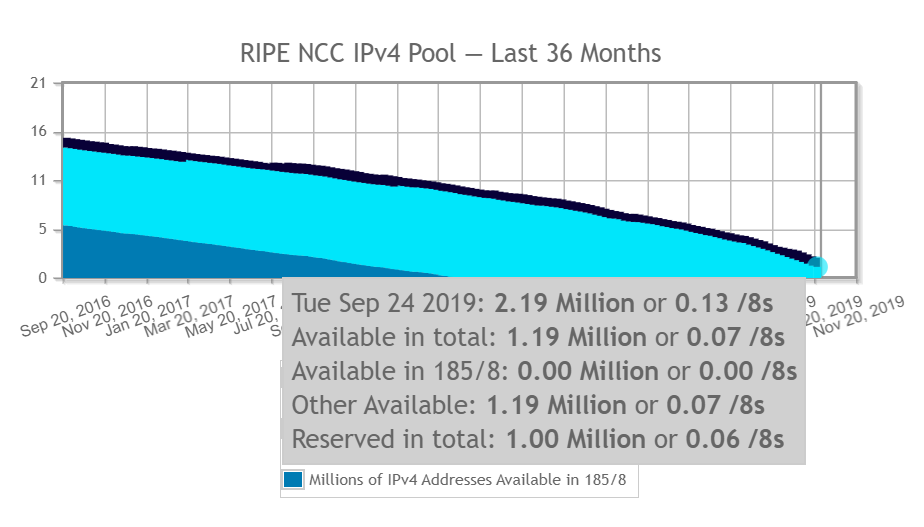Well, not really. It was a little dirty clickbait. But at the RIPE NCC Days conference, which was held on September 24-25 in Kiev, it was announced that the distribution of subnets / 22 would soon end with new LIRs. The issue of running out of IPv4 address space has been talked about for a long time. For about 7 years, since the last blocks / 8 were allocated to regional registries. Despite all the restraining and restrictive measures, the inevitable could not be avoided. About what awaits us in this regard, under the cut.

Historical excursion
When all of your Internet was just created, it seemed to people that 32 bits for addressing would be enough for everyone. 2
32 is about 4.2 billion network device addresses. In the distant 80s, how could the first few organizations united in a network think that someone would need more? Indeed, the first registry of addresses was kept by one uncle named John Postel manually, almost in a regular notebook. And it was possible to request a new unit by telephone. Periodically, the current dedicated addressing was published as an RFC document. For example, in
RFC790 , published in September 1981, for the first time we meet the familiar 32-bit record of IP addresses.
But the concept has “entered”, the global network has begun to actively develop. So the first electronic registries appeared, but fried still did not smell at all. With justification, it was possible to get at least a block of / 8 (more than 16 million addresses) in one hand. Not to say that the justification at that time was checked so.
We all understand that if you actively consume some kind of resource, sooner or later it will end (blessed memory of mammoths). In 2011, IANA, which distributed blocks of addresses on a global scale, distributed the last / 8 to regional registries. On September 15, 2012, the RIPE NCC announced the depletion of IPv4 and began to distribute no more than / 22 (1024 addresses) into one LIR-hands (however, it allowed to open several LIRs per company). On April 17, 2018, the last block 185/8 ended, and since then, for a year and a half, new LIRs have been eating bread crumbs and pasture - blocks returned to the pool for various reasons. Now they are ending. You can watch this process in real time at
https://www.ripe.net/manage-ips-and-asns/ipv4/ipv4-available-pool .
The train left
At the time of the report, approximately 1200 continuous blocks / 22 remained available at the conference. And a rather big pool of unprocessed allocation applications. Simply put, if you are not yet a LIR, the last block / 22 will no longer shine for you. If you are already LIR, but did not apply for the last / 22, there is still a chance. But submitting an application is better yesterday.
In addition to the continuous / 22, there is still a chance to get a combined selection - a combination of / 23 and / or / 24. However, according to current estimates, all these possibilities will be exhausted within a few weeks. Guaranteed by the end of this year about / 22 you can forget.
Some reserves
Naturally, the addresses are not cleared to zero. RIPE has left a specific address space for various needs:
- / 13 for temporary appointments. Addresses can be allocated upon request for the implementation of some time-limited tasks (for example, testing, conferences, etc.). After the implementation of the task, the address block will be selected.
- / 16 for exchange points (IXP). According to estimates, this should be enough for another 5 years.
- / 16 for unforeseen circumstances. They cannot be foreseen.
- / 13 - addresses from quarantine (about it a little lower).
- A separate category is the so-called IPv4 dust - disparate blocks of less than / 24, which cannot be advertised and routed in any way by current standards. Therefore, to hang them unclaimed until an adjacent block is released and at least / 24 is formed.
How are blocks returned?
Addresses are not only allocated, but sometimes fall back into the pool available. This can happen for a number of reasons: a voluntary return as unnecessary, the closure of the LIR due to bankruptcy, non-payment of membership fees, violation of RIPE rules and so on.
But the addresses do not immediately fall into the shared pool. For 6 months they are quarantined so that they are "forgotten" (mainly talking about various black lists, spammers databases, etc.). Of course, much fewer addresses are returned to the pool than issued, but only in 2019 it was already possible to return 1703 blocks / 24. Such returned blocks will be the only opportunity for future LIRs to get at least some IPv4 block.
A bit of cybercriminal
Lack of a resource increases its value and desire to own it. And how not to wish? .. Address blocks are sold at a price of 15-25 dollars apiece, depending on the size of the block. And in connection with the growing deficit, prices are likely to jump even higher. At the same time, having obtained unauthorized access to the LIR account, it is quite possible to transfer resources to another account, and it will not be easy to scratch them back. RIPE NCC, of course, assists in the resolution of any such disputes, but does not assume the functions of the police or the court.
There are many ways to lose your addresses: from the usual racket and password leakage, through the ugly dismissal of a person with access without depriving him of these same accesses, and to completely detective stories. So, at a conference, a representative of one company told how they nearly lost their resources. Some nimble guys on false documents re-registered the company in the company registry. In fact, they made a raider seizure, the sole purpose of which was the removal of IP blocks. Further, having become de jure legal representatives of the company, scammers contacted RIPE NCC to reset access to management accounts and initiated the transfer of addresses. Fortunately, the process was noticed, operations with addresses were frozen “until clarification”. But the legal red tape with the return of the company to the original owners took more than a year. One of the conference participants mentioned that in order to avoid such situations, his company has long moved its addresses to the jurisdiction in which the law works better. Let me remind you that not so long ago we ourselves
registered a company in the EU .
What's next?
While discussing the report, one of the RIPE representatives recalled an old Native American proverb:

It can be considered a thoughtful answer to the question "how can I get some more IPv4." The draft IPv6 standard, which addresses the shortage of addresses, was published back in 1998, and almost all network devices and operating systems released since the mid-2000s support this protocol. Why aren't we there yet? "Sometimes a decisive step forward is the result of a kick in the ass." In other words, providers are just too lazy. Originally, the Belarusian leadership acted with their laziness, obliging them to provide IPv6 support in the country at the legislative level.
However, what will happen to IPv4 allocation? A new policy has already been adopted and approved, according to which, after exhausting the / 22 blocks, new LIRs will be able to receive / 24 blocks as they become available. If there are no blocks at the time of application, the LIR will be put on a waiting list, and will receive (or not receive) the block when it becomes available. Moreover, the absence of a free block does not exempt from the need to pay entrance and membership fees. You will still be able to buy addresses in the secondary market and transfer them to your account. However, RIPE NCC avoids the word “buy” in its rhetoric, trying to abstract from the monetary aspect of what was originally not intended to be a trading object.
As a responsible provider, we encourage you to actively implement IPv6 in your life. And being LIR, we are ready to assist our customers in every way possible.
Do not forget to subscribe to our blog, we plan to publish some other interesting things, overheard at the conference.
Thank you for staying with us. Do you like our articles? Want to see more interesting materials? Support us by placing an order or recommending it to your friends, a
30% discount for Habr users on a unique analogue of entry-level servers that was invented by us for you: The whole truth about VPS (KVM) E5-2650 v4 (6 Cores) 10GB DDR4 240GB SSD 1Gbps from $ 20 or how to divide the server? (options are available with RAID1 and RAID10, up to 24 cores and up to 40GB DDR4).
Dell R730xd 2 times cheaper? Only we have
2 x Intel TetraDeca-Core Xeon 2x E5-2697v3 2.6GHz 14C 64GB DDR4 4x960GB SSD 1Gbps 100 TV from $ 199 in the Netherlands! Dell R420 - 2x E5-2430 2.2Ghz 6C 128GB DDR3 2x960GB SSD 1Gbps 100TB - from $ 99! Read about
How to Build Infrastructure Bldg. class c using Dell R730xd E5-2650 v4 servers costing 9,000 euros for a penny?